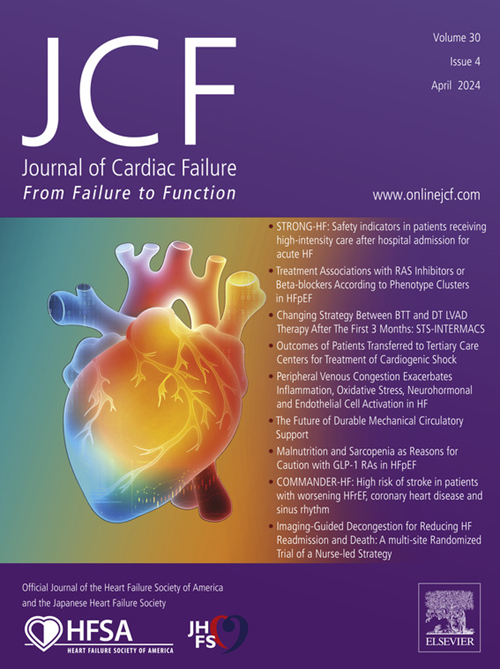Post-Discharge Self-Care Confidence and Performance Levels in Patients Hospitalized due to Heart Failure
IF 8.2
2区 医学
Q1 CARDIAC & CARDIOVASCULAR SYSTEMS
引用次数: 0
Abstract
Background
Multidisciplinary self-care education plays a critical role in ensuring the high-quality transitional care of patients hospitalized due to heart failure (HF). However, whether confidence concerning self-care during their index hospitalizations would influence their post-discharge self-care performances and long-term outcomes remains uncertain.
Methods
We conducted an assessment of 100 consecutive patients with HF who completed self-care questionnaires both during their hospitalizations and 1 year after discharge. Among these patients hospitalized due to HF, self-care confidence was assessed immediately after they completed their pre-discharge education program. One year after the index hospitalization, we evaluated self-care performance by using the European Heart Failure Self-care Behavior Scale. Logistic regression analysis was employed to identify determinants of poor self-care behavior 1 year after the hospitalization. Additionally, the Cox proportional hazards model with adjustment for the Seattle Heart Failure Model was applied to assess their association with 2-year mortality and readmission risk.
Results
The enrolled patients predominantly had HF with reduced ejection fraction (43.0%), and approximately half of the patients had experienced a previous hospitalization due to HF (47.0%). The 3 worst-performing aspects of post-discharge self-care behavior (among the 12 items) were appropriate consultation for fatigue (40.0%), weight gain (52.0%) and application of regular exercise (57.0%). After adjustment, low self-care confidence during the index hospitalization was associated with poor post-discharge self-care performance (OR: 1.11, CI: 1.00–1.21). Poor post-discharge self-care behavior was not associated with worse prognoses over a 2-year follow-up (hazard ratio [HR]: 1.82, CI: 0.85–3.86); however, the association was significant in patients with reduced ejection fraction (HR: 4.04, CI: 1.17–13.89) and previous HF hospitalization (HR: 3.66, CI: 1.46–9.13).
Conclusions
Post-discharge self-care performance was associated with self-care confidence during the index HF hospitalization. Effective measures that improve pre-discharge confidence levels in self-care should be considered to enhance the quality of transitional care.
住院心力衰竭患者出院后自我护理的信心和表现水平。
背景:多学科自我护理教育在确保心力衰竭(HF)住院患者获得高质量的过渡护理方面发挥着至关重要的作用。然而,患者在住院期间对自我护理的信心是否会影响其出院后的自我护理表现和长期预后仍不确定:我们对 100 名连续住院的心衰患者进行了评估,他们在住院期间和出院一年后都填写了自我护理问卷。在这些住院的心房颤动患者中,我们在他们完成出院前教育计划后立即对他们的自我护理信心进行了评估。住院一年后,我们使用欧洲心力衰竭自我护理行为量表对患者的自我护理表现进行了评估。我们采用逻辑回归分析来确定住院一年后自我护理行为不良的决定因素。此外,还采用了调整西雅图心衰模型的 Cox 比例危险模型来评估这些因素与 2 年死亡率和再入院风险的关系:结果:入组患者主要患有射血分数降低型心房颤动(43.0%),约半数患者曾有过心房颤动住院经历(47.0%)。出院后自我护理行为表现最差的三个方面(12 个项目中)分别是适当的疲劳咨询(40.0%)、体重增加(52.0%)和定期锻炼(57.0%)。经调整后,指数住院期间自我护理信心不足与出院后自我护理表现不佳有关(OR:1.11,CI:1.00-1.21)。出院后自我护理表现不佳与2年随访期间的预后较差无关(危险比[HR]:1.82,CI:0.85-3.86);但在射血分数降低(HR:4.04,CI:1.17-13.89)和既往接受过高血压住院治疗(HR:3.66,CI:1.46-9.13)的患者中,两者之间存在显著关联:出院后的自我护理表现与指数高频住院期间的自我护理信心有关。应考虑采取有效措施提高出院前自我护理的信心水平,以提高过渡性护理的质量。
本文章由计算机程序翻译,如有差异,请以英文原文为准。
求助全文
约1分钟内获得全文
求助全文
来源期刊

Journal of Cardiac Failure
医学-心血管系统
CiteScore
7.80
自引率
8.30%
发文量
653
审稿时长
21 days
期刊介绍:
Journal of Cardiac Failure publishes original, peer-reviewed communications of scientific excellence and review articles on clinical research, basic human studies, animal studies, and bench research with potential clinical applications to heart failure - pathogenesis, etiology, epidemiology, pathophysiological mechanisms, assessment, prevention, and treatment.
 求助内容:
求助内容: 应助结果提醒方式:
应助结果提醒方式:


